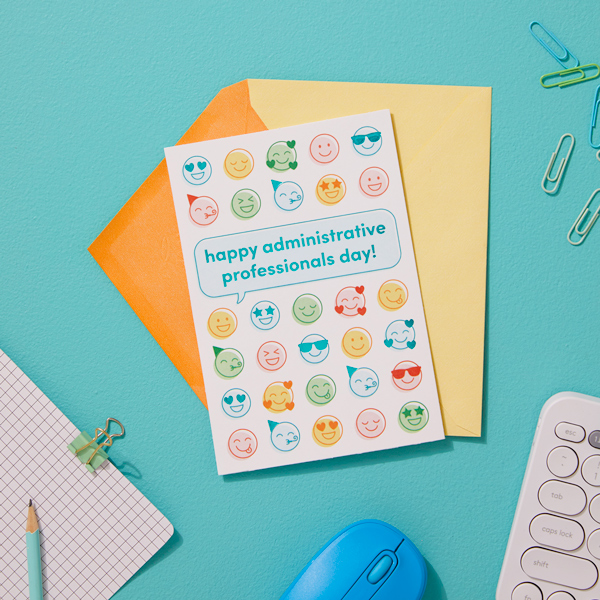Sympathy messages: What to write in a sympathy card

Signing a sympathy card isn’t easy. We search for words. We wonder what would be comforting to hear. We worry about saying the wrong thing…
But even though it’s not easy, it is important to reach out in sympathy. Our words can’t take away the pain of losing a loved one, but they can go a long way toward helping a grieving person feel loved and supported.
You should know right up front that you won’t find the perfect thing to write here. However, you will find ideas from seasoned Hallmark writers for good, helpful and hopeful things to write in a sympathy card.
We hope our tips help you relax, write and share your heartfelt caring with someone who is going through a time of grief.
Inspired? Create and share by tagging @Hallmark.
Sympathy messages: What to write in a sympathy card
- Condolences
- Appreciation
- Offer to Help
- Following Up
- Sudden or Unexpected Death
- When Someone Has Died by Suicide
- When You Cannot Attend the Memorial Service
- Loss of Parent
- Loss of Spouse or Partner
- Loss of Child
- Miscarriage
- Loss of Pet
- Sympathy Closings
- What NOT to Write in a Sympathy Card
- What to write in a sympathy card VIDEO
Condolences
There are many good reasons for keeping your personal sympathy message short. It could be that the card has already expressed most or all of what you wanted to say. Or maybe you didn’t know the deceased well, or at all. Whatever the reason, you can absolutely be brief and still come across as warm and caring.
Examples
- “We are so sorry for your loss.”
- “I’m going to miss her, too.”
- “I hope you feel surrounded by much love.”
- “Sharing in your sadness as you remember your mama.”
- “Your father has been received in joy and love by the Lord. What a beautiful homegoing.”
- “Sending healing prayers and comforting hugs. I am so sorry for your loss.”
- “With deepest sympathy as you remember Robert.”
- “I was saddened to hear that your grandfather passed away. My thoughts are with you and your family.”
- “Remembering your wonderful mother and wishing you comfort.”
- “It was truly a pleasure working with your father for 17 years. He will be deeply missed.”
- “Thinking of you all as you celebrate your sibling’s remarkable life.”
- “Thinking of you all as you celebrate your grandmother’s remarkable life.”
- “We are missing Anne along with you. With heartfelt sympathy,”
- “Thinking of you and wishing you moments of peace and comfort as you remember a friend who was so close to you.”
- “Our family is keeping your family in our thoughts and prayers.”
- “Holding you close in my thoughts and hoping you are doing OK.”
- “Even though there is joy in the homegoing, there is sorrow in your loss. Thinking of you at this tender time.”
- “Te acompaño en estos momentos de gran tristeza.”
Writing tip: If you knew the person who has passed but not the surviving family member(s) to whom you’re sending your card, it might be helpful to mention your connection to their loved one (from school, through work, etc.).
Appreciation
It can be a great comfort to a grieving person or family to hear that others thought highly of their loved one, too. If you knew and admired the loved one who has transitioned, be sure to let your recipient(s) know.
Examples
- “What an amazing person and what a remarkable life. I feel so lucky that I got to know him.”
- “What a good and generous man your father was. I thought his funeral service was a wonderful tribute to him and all he has done for our community. He will be missed.”
- “Your granddad believed in uplifting everyone in his circle. I was one of those people. And I am so honored to have known him.”
- “Your mama was an amazing lady, and I feel privileged to have known her. I know you will miss her deeply. I’ll be keeping you in my thoughts and prayers.”
- “Celebrating the life of a good person and mourning their passing with you.”
- “Celebrating the life of a good man and mourning his passing with you.”
- “Your daughter touched so many lives for the good. I’m grateful I had the chance to know her as both a colleague and a cherished friend.”
- “Your mother blessed so many people with her faith and kindness. Praying that you’ll find comfort in your memories of her and in the knowledge that others are missing her, too.”
- “Our abuela told us our stories, passed down traditions and held us together in love. We are so blessed to come from her and to feel her love from heaven.”
- “I have the best memories of staying with Aunt Edie as a kid. I don’t think I’ve told you this, but starting when I was about 10, she would take me to Becker’s for ice cream cones…and let me drive! Only Aunt Edie…I’m going to miss her fun-loving spirit so much.”
- “Nobody could tell a funny story like your mom. Remember at your graduation party—the story about the vacuuming incident? My face hurt for a full day after from laughing so much. I’ll always cherish those memories of fun times spent with her.”
- “Your mama was always doing for people. A lot of people have been blessed by her kindness and hold her close in their hearts.”
- “Qué persona tan maravillosa y qué vida tan extraordinaria. Me alegra mucho el haberla conocido.”
Writing tip: Need a more specific word than “good” to describe the deceased? Consider one of these: kindhearted, talented, admired, unforgettable, fun-loving, funny, wonderful, well-loved, lovely, sweet, generous, one-of-a-kind, one-in-a-million, honorable, respected, caring, hardworking, strong, energetic, happy.
Offer to Help
If you’re in a position to help your recipient with arrangements, meals, housework, yard work, childcare or something else, then feel free to include an offer to do so as part of your message. Just be sure to follow up and follow through.
Examples
- “I know I can’t make your pain go away, but I want you to know I’m here with a shoulder or an ear or anything else you need.”
- “You’ve got people and we’re here to love on you.”
- “Thinking of your family with love and wanting to help out in any way I can. I’ll call to see when would be a good night to bring over a meal.”
- “You’ve got so much on your mind and on your heart right now. We hope it will make one less worry to know that Kevin and I will be taking care of the yard for as long as you need.”
- “I know this must be a very difficult and demanding time for you all. We are keeping you in our thoughts and prayers. If there is anything we can do—from walking Max to picking up your dry cleaning, please let us know.”
- “It’s so important to get your rest. I’ll take the kids for a couple of hours whenever you need time to sit quietly.”
- “Sé que no puedo desaparecer el dolor que estás sintiendo, pero aquí estoy para lo que necesites.”
Writing tip: In general, the more specific your offer of help, the better. And no task is too small.
Following Up
When someone you know is grieving, you might want to offer ongoing messages of support in the weeks and months following the loss of their loved one. You can send these cards to note an occasion like the loved one’s birthday, a wedding anniversary, holidays or any other time when the grieving person may need extra support.
Examples
- “It’s been a while, but I know that the hurt doesn’t go away when the cards and casseroles do. I’m still here for you.”
- “Just wanted to let you know we’re remembering your mom on her birthday and sending lots of caring thoughts your way.”
- “I know Christmas won’t be the same without DeMarcus, but I hope it helps a little to know that you’re in my thoughts and prayers, especially through the holidays.”
- “Hard to believe it’s been a year since we said good-bye to Noah. Couldn’t let this anniversary go by without letting you know that I’m thinking of you.”
- “This Kwanzaa season, there is a new ancestor to honor. Thinking of you, your mother and your family as you light the kinara.”
- “Solo quería que supieras que sigo pensando en ti y en tu familia.”
Writing tip: You will find some cards specific to sympathy follow-up, but you might also choose to go with an encouragement or thinking-of-you card, or a blank card with a beautiful or lighthearted photo on the cover, depending on the tone you’re going for.
Sudden or Unexpected Death
It’s never easy to lose someone we love. But often, a loss that no one saw coming can lead to complicated grief. This might be because of the deceased’s young age or apparent good health or an accident or other tragic circumstances. Whatever the case, these kinds of losses call for additional comfort, understanding and ongoing support.
Examples
- Words Fail: “I’m not sure what to say in the face of such a difficult loss. Just want you to know that I care about you, and I share in your sadness.”
- Acknowledging Unexpectedness: “We were surprised and saddened to hear about Mike’s passing. He was such a good guy. We’re going to miss him so much, too.”
- I’m Sorry: “I’m deeply sorry your family is experiencing the pain of a loss like this. My heart goes out to each of you.”
- This Is Especially Hard: “We never would have felt ready to say good-bye to someone as special as Christina, but this timing feels especially tough. Wishing your family comfort and strength for the days and weeks ahead. We’ll be praying for all of you.”
- Wishes/Prayers: “Keeping you in my warmest thoughts as you navigate this difficult time—and wishing you hope and healing when you’re ready.”
- I’m Here for You: “It’s going to take time to get through the shock of this loss. Just want you to know we’ll be here for you all the way.”
- Ongoing Support: “Hey, I know it’s been a couple of months since you lost Ernesto. Just want you to know I haven’t forgotten. I’m still thinking about you. And I’m here to help out, listen, whatever you need.”
- Cuando no encuentras las palabras adecuadas: “Ojalá supiera qué decirte ante esta pérdida tan inesperada… Pero lo que sí quiero que sepas es que lo siento mucho.”
Pro Tip: If everything you try to write feels wrong or awkward, then keep your message short. The simple act of sending a card communicates caring—even if you simply sign it “With deepest sympathy” followed by your name.
When Someone Has Died by Suicide
Losing a loved one to suicide is devastating, and the isolation that can result from others not knowing what to say or how to support has its own sting. Making the effort to connect is an important first step. Offer your sincere condolences without questions and without judgment.
Examples
- Loss of Close Friend: “Trey was such a dear and loyal friend. He made an incredible impact on me and I will miss him so much. All my thoughts are with you and your family.”
- Loss of Family Member of Close Friend: “Friend, there are no words for something as heartbreaking as this. I wish you didn’t have to know this pain. Call me any time, day or night, and I’ll be checking in with you through the days and weeks to come.”
- Unintentional (e.g. overdose): “I know how hard your sibling was struggling and how much your family has been through, and I’m so sorry this happened.”
- Military/PTSD: “Your family has served this country with courage and honor. You have so much to be proud of. I hope that can bring you some comfort in your heartache.”
- “It’s not fair that PTSD took someone who already gave so much of himself/herself to others. It shouldn’t be this way. I hope that you feel surrounded by love and support every step of this journey.”
- Young Person: “I’m still stunned about Ramesh. I can’t imagine what such a loving family like yours is going through right now. Ramesh really shone his light when he was here. I loved that about him. He will be remembered and loved always.”
- LGBTQ: “Kai was 100% themselves, and I loved that about them. Their self-assuredness is something that will always inspire me even as I miss them so much. If you ever want to share memories and stories, I’m here.”
- En este momento tan difícil de entender.
- Pérdida de un familiar o amigo: “No puedo imaginar lo que están sintiendo en este momento tan difícil de entender, pero espero que tú y tu familia encuentren paz y consuelo en los gratos recuerdos de su ser amado. Los acompaño en su dolor.”
Writing Tips: Acknowledge that the topic of suicide is very sensitive, and the recipient may have many complicated feelings. It’s important not to share your opinions on suicide and instead be supportive of the person grieving and however they are experiencing grief.
Language Note: In being compassionate toward people whose lives have been impacted by suicide, it is important to avoid terms like “committing suicide,” which can evoke feelings of guilt and blame. Instead, say “died of suicide” or “died by suicide.”
When You Cannot Attend the Memorial Service
It’s a very human instinct to want to offer condolences and support in person when someone has died. However, for a variety of reasons—either your own circumstances or the family’s need to forego or delay a memorial service—it may be impossible to do so. In those cases, you may wish to say a little more in your written message.
Examples
- Wish I Could Be With You: “I wish I could be there to honor your dad along with you. He was a great man.”
- Looking Ahead to a Memorial Later On: “I know Kara’s memorial service won’t happen for a few months yet. Just didn’t want to let that much time go by without reaching out to tell you how saddened I am by her passing. She was such a sweetheart. She’ll be deeply missed.”
- This Is Hard: “It’s hard to lose someone who meant so much to all of us, and even harder that we can’t all be together to say good-bye. We want you to know we’re with you in spirit—now and in the days and weeks ahead.”
- I’m Here for You in Other Ways: “Even though I can’t be there for Tom’s service, just want you to know I’m here to drop food by, mow the lawn or anything else that comes up.”
- Homegoing: “There is a celebration in heaven and a celebration in our hearts even though we can’t be there to put our arms around you.”
- “Ojalá pudiera estar ahí contigo para honrar la memoria de tu papá. Fue un gran hombre.”
Pro Tip: When you can’t be there to honor the deceased in person, you might also choose to make some kind of honoring gesture in addition to sending a sympathy card.
Loss of Parent
It’s never easy to lose a parent. No matter how old we are, no matter how close or complicated the relationship, it hits hard. And it calls for some special words of comfort. (Note: These message examples alternate references to mother and father but could work for either.)
Examples
- Compliment: “Your father was such a wonderful man. I was lucky to know him.”
- She’ll Always Be With You: “You’ll always remember how it felt to laugh with her and be loved by her. I hope those memories will bring comfort in time.”
- He Lives on in You: “The lessons your dad taught you, the love he gave, the way he cared for people…all those good things live on in you.”
- You Were a Comfort: “You were a joy to your mother all your life, and a huge comfort to her over these past few months. It’s sad to lose her, but I hope you feel good about the way you were there for her.”
- Miss Him Too: “Just wanted to say how much your father meant to me, and how much I miss him, too.”
- Loved Her Too: “Your mom was such a good friend. I loved her, too.”
- When You Didn’t Know Him: “I didn’t have the chance to know your father, but I know he must have been someone special to have raised a great son like you.”
- This Is Hard: “It’s so hard saying goodbye to your mom. My heart goes out to you right now.”
- He was a pillar in our community: “Your daddy was father, brother, uncle and wise elder to so many in our community. He was much of a man.”
- Share a Memory: “Nobody could match your dad for making people feel special. I’ll always remember being the smallest kid on the pee-wee baseball team he coached, but feeling big, because he made me team captain.”
- Siempre estará contigo: “El amor infinito de tu mamá siempre permanecerá en tu corazón, y su recuerdo vivirá para siempre en nuestras memorias. Lo sentimos mucho.”
Pro Tip: If you’ve lost a parent yourself, it’s fine to mention that, but take care not to make your message more about you and your experience. Keep the focus on sending comfort and support to the person you’re writing to, and don’t assume you understand exactly how they feel.
Loss of Spouse or Partner
Someone who’s just lost their spouse or partner is both grieving and also facing a huge adjustment to their day-to-day living and sense of identity. Whether they’ve been sharing life for six years or sixty years, it’s a shock to lose that feeling of togetherness in everything. You might choose to acknowledge this in a direct or indirect way in what you write.
Examples
- Compliment the Relationship: “What the two of you shared was truly something special. You loved each other so well.”
- Compliment the Deceased: “Stephanie was one of the funniest, most vibrant people I’ve ever met. I’m so grateful I got to know her.”
- He’ll Always Be With You: “Someone who shared so much of life with you will forever be a part of you. Keeping you in my prayers as you remember your husband.”
- Take Care of Yourself: “I know the days and months ahead will be a big adjustment, so please give yourself a lot of grace. Do whatever you need to take care of you—and know I’m here for you, too.”
- I Believe in You: “I know it must feel like this pain will never end. But I believe in my heart that comfort will find you when you’re ready. I believe you’ve got the strength to come through. And in time, I hope you’ll believe it, too.”
- Miss Her Too: “Linda was such a terrific colleague and friend. I miss her deeply.”
- Loved Him Too: “I hope it helps a little to hear how much Matt was loved by others, too—me, for one.”
- When You Don’t Know the Surviving Spouse/Partner: “Even though we haven’t had the chance to meet in person, I feel like I know you from the glowing way Jim talked about you. It was easy to see how much he loved you.”
- This Is Hard: “Losing the one you love is so hard. And so I’m praying hard for you—for peace, for comfort, for whatever you need right now.”
- Share a Memory: “I was just thinking about Anne’s unforgettable dinner parties—especially the one with the notorious lemon-bar incident. That was the best. And SHE was the best.”
- Share What’s True: “He held you down and lifted you up in this world. I hope you can still feel him and his love around you.”
- Admiración hacia la pareja: “El amor que compartieron fue realmente especial. Deseo de todo corazón que su recuerdo te traiga tranquilidad y consuelo.”
Writing Tip: For a surviving spouse who still has kids living it home, consider including them in your message. You could mention them in your greeting (“Dear Ellen and Family” or “Dear Finn, Katie, and Joe”), in the body of your message, or both. Another option would be to send a separate card to each of the kids.
Loss of Child
This is an especially tough one. Every parent wants so much to nurture, protect, and see their child grow up, but sadly, life doesn’t always work out that way. When writing to someone who’s lost a child, try to relax and remember that the gesture of reaching out will probably mean just as much as the actual words you write.
Examples
- Compliment: “Della was such a sweet girl. I wish she could have stayed with you, and with all of us, for so much longer.”
- They’ll Always Be a Part of You: “You’ll always miss Alex, but they’ll always be with you in the memories you keep, the stories your family tells, the laughter you share, and the love you all hold for them. May those good things help heal the hurt in time.”
- I’m Sorry: “So deeply sorry you have to go through a heartbreak like this. Sharing in your sorrow and keeping your family in our most caring prayers.”
- Time Was Short/Love Was Big: “Even though Maddie was with us for too short a time, she filled the world around her with so much joy. And you filled hers with so much love.”
- His Life Mattered: “Though we only got to hold him for a little while, he brought us together and brought so many smiles. Celebrating all the days that were brighter because he was here.”
- Loved Her Too: “I hope there’s some comfort in knowing how much we loved Aya, too.”
- Miss Him Too: “Missing Henry right along with you.”
- This Is Heartbreaking: “It just feels wrong that you should have to say goodbye to your child. Whatever you’re feeling, please know you’re not alone. I’m just one of many who want to do whatever we can to support you in the weeks and months to come.”
- Share a Memory: “Jamal was the first to be a friend to anybody who needed one. I was just remembering when our class got a new student this spring, and Jamal made a point of sitting with him at lunch. He was a special kid.”
- Siempre será parte de ti: “Tu hijo es una estrella en el cielo, y su luz iluminará siempre tu camino y tu corazón.”
Writing Tip: You can adapt most of these message ideas for parents who have lost an adult son or daughter. The heartbroken feeling that life isn’t supposed to work like this will still apply—and the need for caring, support, and prayers will be similar, too.
Miscarriage
Miscarriage is the kind of loss that you may only know about if you’re part of the mom’s or couple’s inner circle of family and friends. If that’s the case, you have a unique opportunity be a source of comfort and support in a world that doesn’t know.
Examples
- Your Loss Is Real: “The love you felt for your baby-to-be was real, and so is the loss you’re experiencing. I hope you can be gentle with yourself and honor whatever you’re feeling right now.”
- I’m Sorry: “I’m so sorry you’ve had to let go of the dreams you were already cherishing for your baby.”
- This Is Hard: “I can’t begin to understand all you’re feeling right now, but I know it can’t be easy. I wish you didn’t have to go through a loss like this.”
- Wish for Healing: “Keeping you and Keisha in my thoughts and hoping for healing to come to you in time.”
- I’m Here for You: “I was deeply saddened to hear you’ve had a miscarriage. Just want you to know I’m here for you—to talk, to bring over a meal, or whatever you need right now.”
- It’s Not Your Fault: “Just wanted to remind you that there was nothing you could or should have done differently. Sometimes these things just happen. I’m sorry it had to happen to you.”
- Lo siento: “Siento mucho la pérdida de tu bebé. Aquí estoy para ti, para hablar, para escucharte, para lo que necesites.”
Writing Tip: It’s sad for an expecting mother to lose a pregnancy even when she already has children, or may go on to have others. So avoid saying anything like “At least you already have Emma” or “You can always try again.” Those thoughts come from a good place, but they risk implying that the mom or couple should just get over it quickly and move on.
Find more messages and ways to support parents who have lost a baby.
Loss of Pet
Pets are genuinely family members for a lot of us, and when we lose one, it can be a huge comfort to have others recognize how much they meant and how sad it is to say goodbye.
Examples
- Compliment: “Benny was such a good dog. So sorry you’ve had to say goodbye to him.”
- You Loved Her Well: “From your first hello, to your last goodbye, Shadow felt how much you loved her. She was one lucky kitty to have you for her person.”
- Wish for Good Memories: “Wishing you smiles amid the tears as you remember happy times with your loyal companion and friend.”
- She’ll Always Be Part of You: “Trixie may be gone from your lap, but she’ll stay in your heart forever.”
- Miss Him Too: “I was so sorry to hear about Speck. I sure am going to miss seeing him when I’m out walking.”
- She Meant a Lot: “Our fur babies hold such an important place in our lives and our hearts. Thinking of you as you remember Gertie.”
- Share a Memory: “I’ll never forget walking into your kitchen and finding every single cabinet open and Fluff peeking out from a drawer. He was such a clever cat.”
- “Lucas era un perro tan bueno y cariñoso. Siento mucho que hayas tenido que decirle adiós.”
Pro Tip: If your recipient has had to make the hard decision to have their pet put to sleep, consider affirming them in that decision. Let them know you support their choice, that you know it wasn’t easy, that you share their sadness but are glad their friend isn’t hurting anymore.
Sympathy Closings
A warm, respectful closing is a graceful way to wrap up your sympathy message. Choose one of these, or create your own.
- With sympathy,
- With deepest sympathy,
- With heartfelt sympathy,
- With prayers and sympathy,
- With sincere sympathy,
- With warm thoughts and prayers,
- With caring,
- With love at this sad time,
- In caring sympathy,
- With you in sorrow,
- Sharing your sadness,
- Thinking of you,
- Caring thoughts are with you,
- God bless,
- God bless you and comfort you,
- Keeping you in our prayers,
- Lifting you up in prayer,
- Praying for you,
- Wishing you peace,
- Wishing you healing,
- My heart goes out to you,
- Please accept our condolences,
- My sincere condolences,
- Prayerfully,
- Con el más sentido pésame,
What NOT to Write in a Sympathy Card
Here are a few thoughts and phrases to avoid in sympathy cards, because they risk either minimizing the recipients’ unique feelings of grief or actually making them feel worse.
Examples
- “I know how you feel.” We all experience and process grief differently.
- “She was so young.” No need for a potentially painful reminder.
- “What a terrible loss.” Avoid dwelling on the pain or difficulty of the loss.
- “You should…” Instead of advice, offer comfort and support.
- “You will…” Steer clear of predictions about how their grief journey will go.
- “This happened for a reason.” Even with the best intentions behind it, this thought risks assigning blame for the death.
- “Sé cómo te sientes.” No es bueno asumir cómo se sienten las personas. Todos experimentamos el duelo de manera diferente.
Writing tip: If you’re still worried about saying the wrong thing, then keep your message very short. The simple act of sending the card lets your recipient know you care.
What to write in a sympathy card VIDEO
Find out the simple formula for crafting your own sympathy message and get some real life examples and watch-outs from Hallmark Senior Writer Cat Hollyer.
Sympathy Gifts to Show You Care
See allYou may also like
See more-
Card Ideas Card messages for kids: What to write in a kid’s holiday card and more
My 3-year-old was having a hard time at preschool drop-off. Dragging his feet. Asking to stay home. This went on a fe...
-
Sympathy How to support a grieving friend
Advice on how to support a grieving friend, directly from people who went through it. Get ideas to show you care here.
-
Sympathy Sympathy gift ideas for offering your condolences and support
Many times, we don’t know what to say after a loss. It can be difficult to determine what will comfort a hurting frie...
-
Sympathy 75+ grief quotes to give you comfort and help you heal
Grieving the loss of a loved one feels different for everyone, and there’s no telling what will bring comfort on a ha...
-
Card Ideas Sending Cards and Letters: Our Best Advice and Ideas
Maybe you’ve made it a goal to develop a letter writing habit. Maybe you have someone you feel the need to reach out ...
-
Friends Friendship messages: What to write in a friendship card
Whether it’s your friend’s birthday or just any old day, sending a card is a great way to bring a smile and nurture ...
-
Graduation What to write in a graduation card
Hats off to graduates! Whether they’re earning a diploma, a program certificate, a degree or even a cool new professi...
-
Valentine's Day Ways to find comfort and hope when you’re grieving on Valentine’s Day (or support someone who is)
Grief is always hard, but especially on Valentine’s Day. From social media to stores to kids’ classrooms, it can feel...
-
Valentine's Day How to survive Valentine’s Day after a divorce or breakup
We know that ending a relationship can be extremely heartbreaking. It’s a very significant loss, and when Valentine’s...
-
Valentine's Day 100+ kids valentine messages: From kid-to-kid, for teacher and more
Refrigerator doors everywhere will soon be covered with valentines from kids. The right message added inside can make...
-
Christmas Christmas wishes: What to write in a Christmas card
Get sample messages, tips and watch our new video guide to write the perfect Christmas card.
-
Mother's Day What to write in a Mother's Day card
Chances are you know at least a few moms who deserve a shout-out on Mother’s Day. If you’d like some creative ideas f...
-
Valentine's Day Valentine messages: What to write in a Valentine's Day card
Back in the day, when you had to come up with a valentine for everyone in your class, it was enough just to sign your...
-
Father's Day Father's Day messages: What to write in a Father's Day card
Find just the right Father's Day message to tell Dad just how much you appreciate him.
-
Card Ideas Card messages for kids: What to write in a kid’s birthday card
After the birthday party, when the calm has returned, is when my kids come back to their birthday cards. The cards ar...
-
Birthday What to write in a birthday card
Some people have no problem coming up with what to write in a birthday card. Just hand them a pen and they’ll effortl...
-
Mother's Day Mother's Day without Mom: Remembering lost loved ones with new traditions
This Mother’s Day will be my third without my mom. She died just before Thanksgiving and Christmas in 2020, which mad...
-
Card Ideas What to write: Message ideas for Administrative Professionals Day
Everyone knows that behind every well-run office is a great administrative assistant, and Administrative Professional...
-
Care & Concern What to Write When Trying to Reconcile With a Loved One
Being estranged from someone hurts, plain and simple. And in today’s society, it’s increasingly common. According to ...
-
Lifestyle How to Write an Obituary: What to Say About the Life of a Loved One
Summarizing a loved one’s life can feel like an impossible task, especially when you’re grieving. It’s even more chal...





















